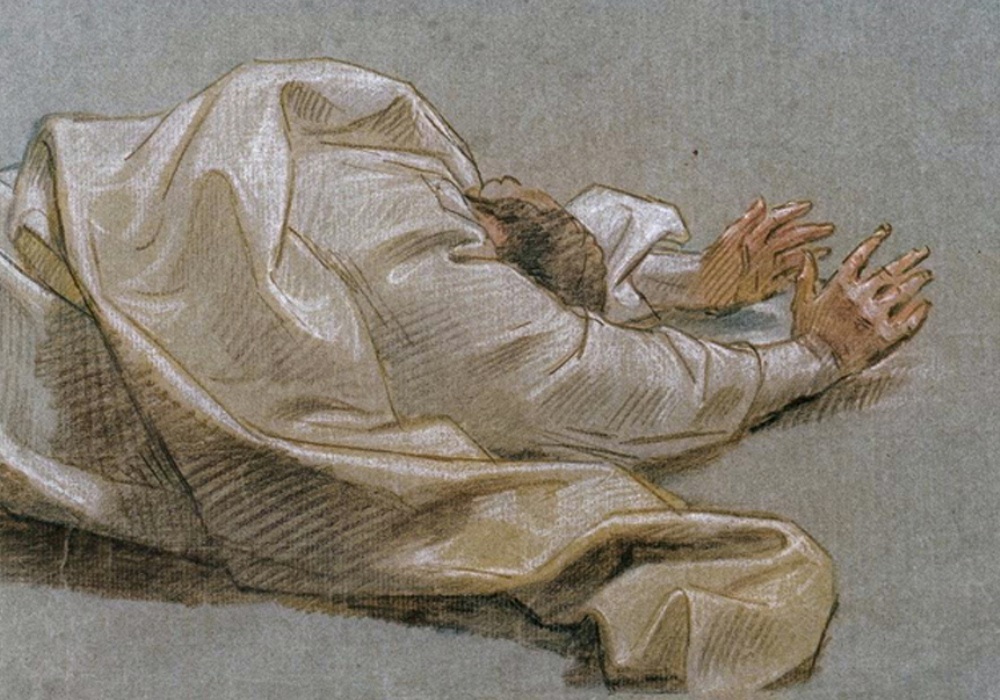
by David Clarkson (1621-1686)
“For this ye know, that no whoremonger, nor unclean person, nor covetous man, who is an idolater, hath any inheritance in the kingdom of Christ and of God.” Ephesians 5:5
A covetous man is an idolater. Not only the covetous, but the immoral, are idolaters. For the apostle, who here makes covetousness to be idolatry, considers voluptuous people to be idolaters also, where he speaks of some who make their belly their God (Phil. 3:19). Indeed, every reigning lust is an idol—and every person in whom it reigns is an idolater. “The lust of the flesh, the lust of the eye, and the pride of life.” Pleasures, and riches, and honors are the carnal man’s trinity. These are the three great idols of worldly men, to which they prostrate their souls! And giving that to them which is due only to God, they hereby become guilty of idolatry. That this may be more evident—that covetousness, immorality, and other lusts are idolatry—let us consider what it is and the several kinds of it.
Idolatry is to give that honor and worship to ‘the creature’, which is due to the Creator alone. When this worship is communicated to other things, whatever they are, we thereby make them idols, and commit idolatry. Now this worship due to God alone, is not only given by the savage heathen to their stick and stones—and by papists to angels, saints and images—but also by carnal men to their lusts.

1. External, which consists in acts and gestures of the body. When a man bows to or prostrates himself before a thing, this is the worship of the body. And when these gestures of bowing, prostration are used, not out of a civil, but a religious respect, with an intention to testify divine honor, then it is worship due only to God.
2. Internal, which consists in the acts of the soul and actions answerable thereto. When the mind is most taken up with an object and the heart and affections most set upon it, this is ‘soul worship’—and this is due only to God. For He being the chief good and the chief end of intelligent creatures, it is His due, proper to Him alone, to be most minded and most loved. It is the honor due only to the Lord to have the first, the highest place, both in our minds and hearts and endeavors.
Now according to this distinction of worship–
1. Open, outward idolatry, when men, out of a religious respect, bow to, or prostrate themselves before anything besides the true God. This is the idolatry of the heathen, and in part, the idolatry of papists.
2. Secret and soul idolatry, when the mind is set on anything more than God; when anything is more valued than God, more desired than God, more sought than God, more loved than God. Then is that soul worship, which is due only to God.
Hence, “secret idolaters” shall have no inheritance in the kingdom of God. Soul idolatry will exclude men out of heaven as well as open idolatry. He who serves his lusts is as incapable of entering heaven, as he who worships idols of wood or stone!
Before we come to confirm and apply this truth, it will be requisite to make a more clear discovery of this secret idolatry. In order thereunto, observe, there are–
1. ESTEEM. That which we most highly value, we make our God. For esteem is an act of soul worship. Worship is the mind’s esteem of a thing as most excellent. Now the Lord demands the highest esteem, as an act of honor and worship due only to Himself. Therefore, to have an high esteem of other things, when we have low thoughts of God, is idolatry. To have an high opinion—of ourselves—of our abilities and accomplishments—of our relations and enjoyments—of our riches and honors—or those that are rich and honorable—or anything of like nature, when we have low opinions of God, is to advance these things into the place of God—to make them idols and give them that honor and worship which is due only to the divine Majesty. What we most esteem—we make our god. If you hold other things in higher esteem than the true God, you are idolaters (Job 21:14).
2. MINDFULNESS. That which we are most mindful of—we make our God. For to be most remembered, to be most minded, is an act of worship which is proper to God, and which He requires as due to Himself alone (Ecc. 12:1). Other things may be minded; but if they be more minded than God, it is idolatry—the worship of God is given to the creature. When you mind yourselves, mind your estates and worldly interests, mind your profits or pleasures more than God—you set these up as idols in the place of God.
When that time, which should be taken up with thoughts of God, is spent in thoughts of other things—when God is not in all your thoughts—or if He sometimes is there, yet if other things take a higher place in your thoughts—if when you are called to think of God—as sometimes every day we should do with all seriousness—if ordinarily and willingly you make these thoughts of God give place to other things, it is idolatry.
If either you do not think of God or think otherwise of Him than He is—think Him all mercy, disregarding His justice—think Him all pity and compassion, disregarding His purity and holiness—think of His faithfulness in performing promises, not at all regarding His truth in execution of threatenings—think Him all love, not regarding His sovereignty—this is to set up an idol instead of God. Thinking otherwise of God than He has revealed Himself—or minding other things as much or more than God—is idolatry.
3. INTENTION. That which we most aim at, we make our God. For to be most intended is an act of worship due only to the true God. For He being the chief good—He must be the chief end. Now the chief end must be our chief aim—it must be intended and aimed at for itself; and all other things must be aimed at for its sake in a subserviency to it.
Now, when we make other things our chief aim or main design, we set them up in the stead of God and make them idols. When our chief design is to be rich, or great, or safe, or famous, or powerful—when our great aim is our own ease, or pleasure, or credit, or profit and advantage—when we aim at, or intend anything more, or anything as much, as the glorifying and enjoying of God—this is soul idolatry.
4. RESOLUTION. What we are most resolved for, we worship as God. Resolvedness for God, above all things, is an act of worship which He demands as due to Himself alone. To communicate it to other things is to give the worship of God unto them, and so to make them gods. When we are fully resolved for other things—for our lusts, pleasures, outward advantages—and but faintly resolved for God, His ways, honor, service—this is soul idolatry.
When we resolve presently for other things, but refer our resolves for God to the future—”Let me get enough of the world, of my pleasure, of my lusts, now—I will think of God hereafter, in old age, in sickness, on a deathbed”—these are idolatrous resolutions. God is thrust down—the creatures and your lusts advanced into the place of God—and that honor which is due only to Him, you give unto idols.
5. LOVE. That which we most love—we worship as our God. For love is an act of soul-worship. To love and to adore are sometimes both one. That which one loves—he worships. This is undoubtedly true, if we intend hereby that love which is superlative and transcendent—for to be loved above all things is an act of honor and worship, which the Lord demands as His due in peculiar (Deut. 6:5). In this the Lord Christ summed up all that worship which is required of man (Mat. 22:37). Other things may be loved—but He will be loved above all other things. He is to be loved transcendently, absolutely, and for Himself. All other things are to be loved in Him and for Him. He looks upon us as not worshiping Him at all, not taking Him for a God, when we love other things more or as much as Himself (1 John 2:15). Love to the creature, whenever it is inordinate, it is an idolatrous affection.
6. TRUST. That which we most trust we make our God. For confidence and dependence is an act of worship, which the Lord calls for as due only to Himself. And what act of worship is there which the Lord more requires than this soul-dependence upon Him alone? “Trust in the Lord with all your heart” (Prov. 3:5). He will allow no place for confidence in anything else. Therefore, it is idolatry to trust in ourselves—to rely upon our own wisdom, judgments, abilities, accomplishments. The Lord forbids it (Prov. 3:5).
To trust in wealth or riches—Job disclaims this and reckons it among those idolatrous acts that were punishable by the judge (Job 31:24). And our apostle, who calls covetousness idolatry, dissuades from this ‘confidence in riches’ as inconsistent with confidence in God (1 Tim. 6:17). To trust in friends though many and mighty—He fixes a curse upon this as being a departing from—a renouncing of God—an advancing of that we trust into the room of God (Psalm 136:3). Psalm 118:8, 9—”It is better to trust in the Lord than to put confidence in man. It is better to trust in the Lord than to put confidence in princes.” The idolatry of this confidence is expressed, in that the true God is laid aside. Trust in the creature is always idolatrous.
7. FEAR. That which we most fear, we worship as our God. For fear is an act of worship. He who fears, worships that which is feared—which is unquestionable when his fear is transcendent. The whole worship of God is frequently in Scripture expressed by this one word “fear” (Mat. 4:10; Deu. 6:13); and the Lord demands this worship, this fear, as due to Him alone (Isa 50:12, 19). That is our god which is our fear and dread (Luke 12:4, 5). If you fear others more than Him, you give that worship to them which is due only to God—and this is plain idolatry.
8. HOPE. That which we make our hope we worship as God. For hope is an act of worship—and worship is due only to God. It is His prerogative to be the hope of His people (Jer. 17:13; Rom. 15:13). When we make other things our hope, we give them the honor due only to God. It is a forsaking of the Lord the ‘Fountain’—and setting up of ‘broken cisterns’ into His place (Jer 2:13), hereby worshiping them as God. Thus do the papists openly, when they call the virgin mother, the wooden cross, and departed saints, their hope. And thus do others among us, who make their prayers, their sorrow for sin, their works of charity, or any acts of religion or righteousness, their hope—when men expect hereby to satisfy God’s justice, to pacify God’s displeasure, and to procure heaven. Nothing can effect this, but that which is infinite—the righteousness of God. And this we have only in and from Christ. He is therefore called our hope (1 Tim. 1:1); “our hope of glory” (Col 1:27). Those who make their own righteousness the foundation of their hope—they exalt it into the place of Christ and honor it as God.
9. DESIRE. That which we most desire—we worship as our God. For that which is chiefly desired, is the chief good, in the estimation of the one who desires it. And what he counts his chief good, that he makes his god. Desire is an act of worship—and to be most desired is that worship, that honor, which is due only to God. To desire anything more, or as much, as the enjoyment of God—is to idolize it, to prostrate the heart to it, and worship it as God alone should be worshiped. He alone should be that one thing desirable to us above all things. “One thing have I desired of the Lord, that will I seek after—that I may dwell in the house of the Lord all the days of my life, to behold the beauty of the Lord, and to inquire in his temple.” Psalm 27:4
10. DELIGHT. That which we most delight and rejoice in—that we worship as God. For transcendent delight is an act of worship due to God alone. And this affection in its height and elevation is called glorying. That which is our delight above all things, we glory in it—and this is the prerogative which the Lord demands (1 Cor. 1:31; Jer. 9:23, 24). To rejoice more in our wisdom, strength, riches, than in the Lord—is to idolize them. To take more delight in relations, wife, or children, in outward comforts and accommodations, than in God—is to worship them, as we ought only to worship God. To take more pleasure in any way of sin, uncleanness, intemperance, earthly employments—than in the holy ways of God—than in those spiritual and heavenly services wherein we may enjoy God—is idolatry.
11. ZEAL. That for which we are most zealous, we worship as God. For such a zeal is an act of worship due only to God. Therefore, it is idolatrous to be more zealous for our own things—than for the things of God—to be eager in our own cause; and careless in the cause of God—to be more vehement for our own pleasure, interests, advantages; than for the truths, ways, honor of God—to be fervent in following our own business, promoting our designs; but lukewarm and indifferent in the service of God—to count it intolerable for ourselves to be reproached, slandered, reviled; but manifest no indignation when God is dishonored, His name, Sabbaths, worship, profaned; His truths, ways, people, reviled—this is idolatrous.
12. GRATITUDE. That to which we are most grateful, that we worship as God. For gratitude is an act of worship. We worship that for which we are most thankful. We may be thankful to men, we may acknowledge the helpfulness of means and instruments—but if we rest here and rise not higher in our thanks and acknowledgments—if the Lord is not remembered as Him without whom all these are nothing—it is idolatry. For this the Lord threatens those idolaters (Hos. 2:5, 8). Thus when we ascribe—our plenty and riches to our care and industry—our success to our prudence and diligence—our deliverances to friends, means, instruments—without looking higher—or not so much to God as unto these—we idolize them, sacrifice to them, as the prophet expresses it (Hab. 1:16). To ascribe that, which comes from God unto the creatures, is to set them in the place of God and so to worship them.
13. When our care and industry is more for other things, than for God—this is idolatrous. No man can serve two masters. We cannot serve God and mammon—God and our lusts also—because this service of ourselves and of the world, takes up that care, that industry, those endeavors, which the Lord must have of necessity, if we will serve Him as God. And when our time and endeavors are laid out for the world and our lusts, we serve them as the Lord ought to be served—and so make them our gods. When you are more careful and industrious to please men or yourselves, than to please God—when you are more careful to provide for yourselves and posterity, than to be serviceable unto God—when you are more careful as to what you shall eat, drink, or be clothed, than how you may honor and enjoy God—when you are more careful to make provision for the flesh, to fulfill the lusts thereof, than how to fulfill the will of God—when you are more industrious to promote your own interests, than the designs of God—when you are more careful to be rich, or great, or respected among men, than that God may be honored and advanced in the world—when you are more careful how to get the things of the world, than how to employ them for God—when you rise early, go to bed late, eat the bread of carefulness, that your outward estate may prosper, while the cause, and ways, and interests of Christ have few or none of your endeavors—this is to idolize the world, yourselves, your lusts, your relations, while the God of heaven is neglected! And the worship and service due unto Him alone is hereby idolatrously given to other things!
He who makes Christ his chief aim, if at length he finds Him whom his soul loves—this quiets his heart—whatever he lacks, whatever he loses besides. He counts this a full recompense for all his tears, prayers, inquiries, waitings, endeavors.
Therefore, my dearly beloved, flee from idolatry!
1 Corinthians 10:14
This article was originally published by The Heartbeat of The Remnant magazine. Issue: January/February 2006







